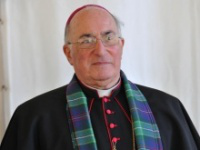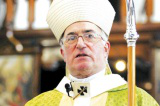Glasgow: Archbishop Mario Conti issues statement on marriage

Archbishop Mario Conti
To coincide with a national campaign launched across Scotland's Catholic parishes, Archbishop Mario Conti of Glasgow has released a detailed statement on the Catholic Church's position on the definition of marriage and its response to attempts to dismantle the definition. In his document Archbishop Conti advises: "Those in Government need to be respectfully reminded that a mandate to govern does not include a mandate to reconstruct society on ideological grounds" Refering to proposals to redefine marriage, the Archbishop adds; "The Catholic Church, for one, will not accept it, and indeed will actively campaign against it."
Archbishop Conti's text will form the basis of a letter being sent to all of Scotland's 500 Catholic parishes urging Catholics to complete a declaration in defence of marriage it will be part of a mailing of 100,000 campaign postcards distributed by the Catholic Parliamentary Office encouraging responses to be submitted to the Scottish Government’s consultation
The full text of the Archbishops statement is shown below.
Jesus responded to a question on marriage by going right back to the beginning: “Have you not read that the Creator, from the beginning, ‘made them male and female’, and that he said: ‘This is why a man must leave father and mother and cling to his wife and the two become one body.’” (Matthew, 19: 4-5)
The question was on divorce, not, as now raised by the Scottish Government, on whether a union of two persons of the same sex might be a “marriage”. Indeed that question was unthinkable, and has remained so throughout the Judaeo-Christian era until the present time, and not only within the moral and social order of our own
western civilisation, but also in the other great world religions and traditional philosophical systems of thought.
Today’s question arises within a largely post-Christian society, which retains certain values which have characterised Christianity, most notably compassion for the disadvantaged and a desire to build inclusive social structures. It is a society, however, which increasingly tolerates sexual promiscuity, while reacting strongly, and rightly so, to all instances of sexual abuse.
However the question would not be asked were it not for the increasing acceptance, wittingly or unwittingly, of a particular ideology which considers all structures and ethical systems as inimical to human freedom. It places personal autonomy above even physical realities so that, for example, the very determination of one’s own sex and gender is regarded as an issue of choice – even a supposed human right.
Of course any system of human rights presupposes a legal framework and the ability of individuals to defend what is justly theirs, which is why such an ideology, which, of its nature would tend towards moral anarchy, seeks to have changes in the law to accommodate its demands.
In other words, those who hold to this ideology rely on the modern preoccupation with human rights to press for a change in the concept and definition of marriage to cover what any group in society might want it to be. It provides same sex advocates with a philosophical tool to seek a change in our law and our definition, to serve
their own purposes.
While there may be some who, acting out of a religious instinct and desire, wish to receive the blessing of religion on a same sex union - and indeed there may be some ministers of religion desirous to give it - in truth this campaign has very little to do with religion and everything to do with a change in the concept of marriage,
ostensibly to grant equality to same sex couples.
The first successful moves in this direction, led Government to introduce the legal instrument of civil partnership. Those of us who foresaw the way that it would likely develop were not in favour of this legal instrument but could be persuaded that it was done in the interests of fairness, ie according to justice, so that same sex couples might enjoy some of the mainly financial and fiscal benefits of married couples.
However it is worth reflecting that discrimination in their favour left other couples, equally engaged in supporting one another, without such legal and fiscal benefits. Indeed in the logic of discrimination as applied today, these latter may well consider themselves as discriminated against!
Those in Government need to be respectfully reminded that a mandate to govern does not include a mandate to reconstruct society on ideological grounds, nor to undermine the very institution which, from the beginning, has been universally acknowledged as of the natural order and the bedrock of society, namely marriage and the family. In terms of law, its support and defence have been on a par with the defence of life itself. We weaken it at our peril.
There are those who would argue that the contract of two persons in an exclusive sexual relationship is what constitutes marriage. From a Catholic and traditional perspective that is only part of the essence of marriage since it is the procreative aspect of marriage as well as its unity which is of its essence. No one versed in Christian teaching can be ignorant of that truth which the Catholic and Orthodox Churches and those who follow their tradition regard as a sacrament, something created by God himself, blessed by Christ, for the spiritual as well as the social and material benefit of those who regard it as a“holy state”.
Marriage was not instituted by civil society, though civil society saw its importance and defended it through its laws. However many of the laws relating to marriage, certainly in the west, arose out of the Church’s own laws and there are countries which still recognise the Church’s competence in this field.
There is more to marriage therefore, than a service of blessing. However for a minister of a church to bless a marriage implies that the marriage is in conformity not simply with the laws of the Church, but with the institution itself, which ultimately, as part of the natural order, is instituted by God.
No Church on its own authority, wishing to remain faithful to its Christian heritage, can be justified in unilaterally altering what has been handed down to us from the beginning.
Nor is Christianity alone in holding marriage in such respect. There are many within our own society, members of the great world religions, whose support of the family matches that which we in the Catholic Church ourselves maintain.
While on the face of it, and to many, the redefining of civil partnerships as “marriage” may seem a small step and one that ought to be taken out of consideration for the feelings of those who are unable to form the relationship with a person of the opposite sex which has traditionally been described as marriage, such a
determination by the Government is of serious import and will be rightly resisted by many.
The Catholic Church, for one, will not accept it, and indeed will actively campaign against it.
This cannot be seen to be in any way helpful in fulfilling the broader aim of social cohesion by which Government is clearly motivated. It will act to create larger divisions in society and could lead in the future, as we have seen in some of the legislation to date, to gross allegations of discrimination.
There will be other consequences in law, and social policies stemming from it which need to be taken into account, for example housing provision, social security entitlements and the legitimate expectations of families for support in having and bringing up children on whom the future of society depends, and for which society
should make provision.
Members of the Scottish Parliament should recall what is written on the mace of that institution, words which reflect the traditional cardinal virtues – those by which everyone must act and most particularly, those who govern.
Justice is of course included among them, but the first named is prudence, or as expressed on the mace by the word “wisdom”. Prudence, or wisdom, means taking into account all aspects of one’s decisions and actions, seeing them in the broader picture – described by a sage from the past (Pope St Gregory the Great) as “seeing
life whole”.
More than any other, that is the task of Government and it has traditionally been the duty of the Church to offer insightful guidance on moral matters. The Catholic Church will not fail in attempting to do so, nor in guiding its own members and influencing public opinion towards moral truth.
Source: SCMO

















